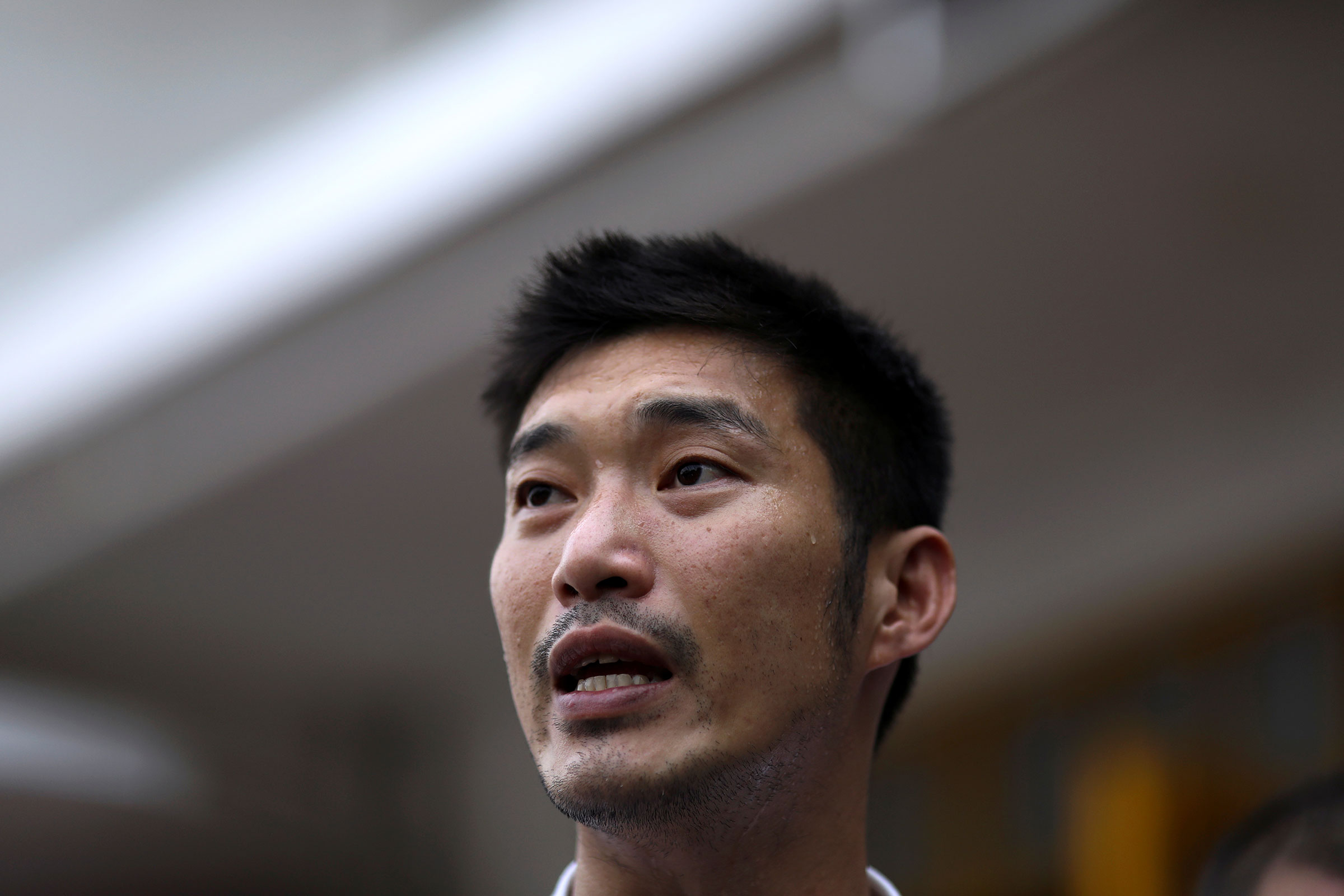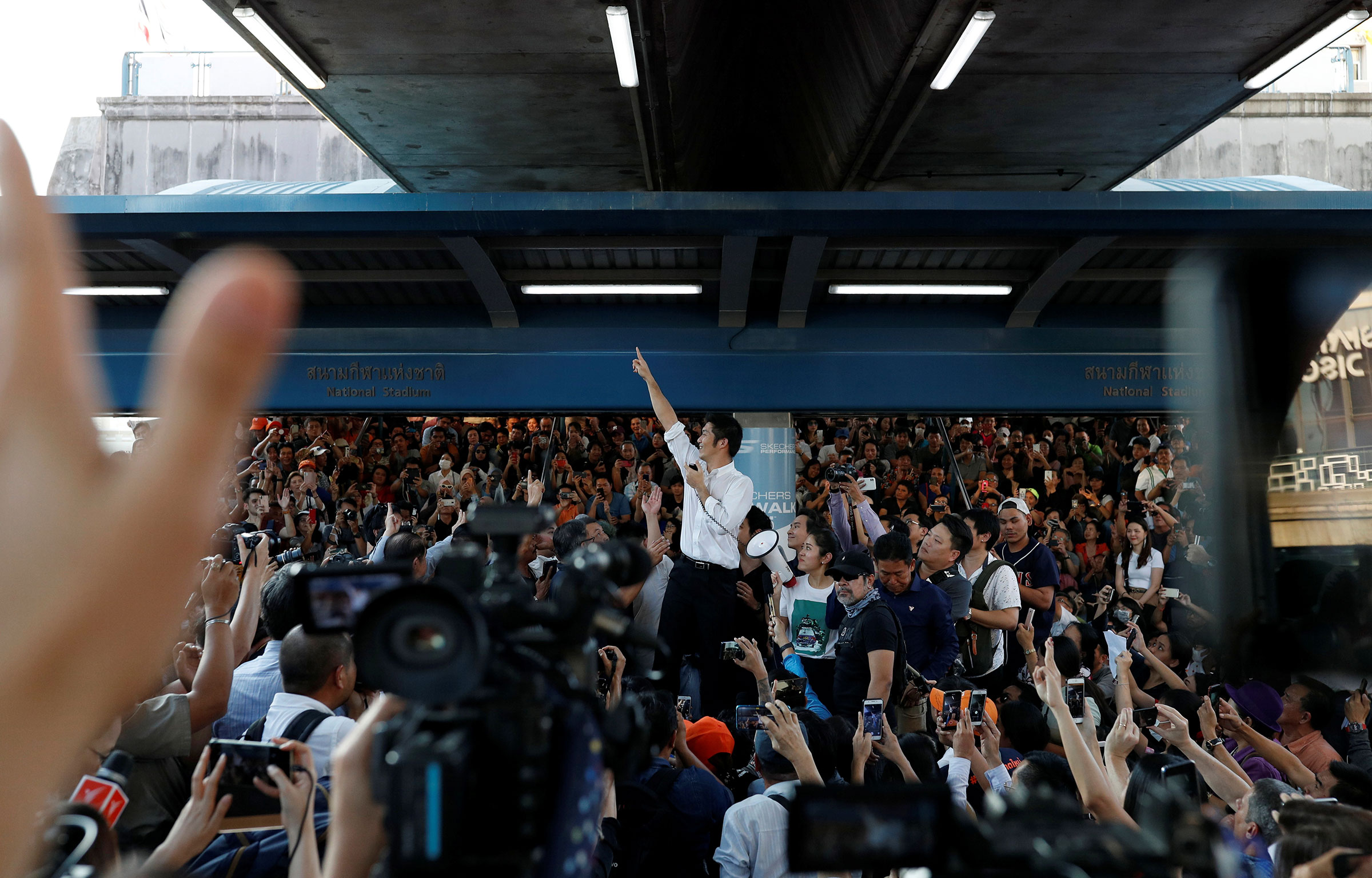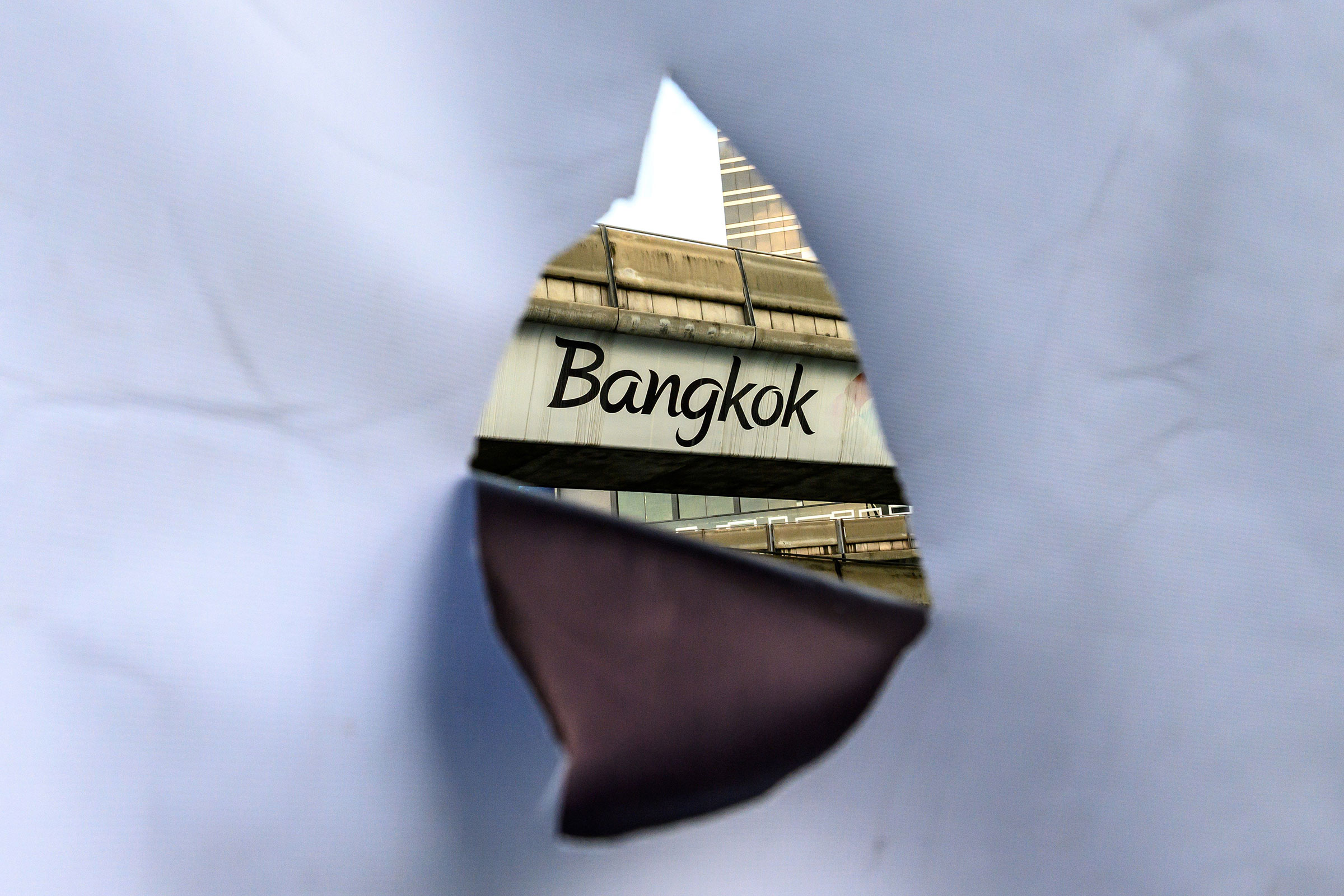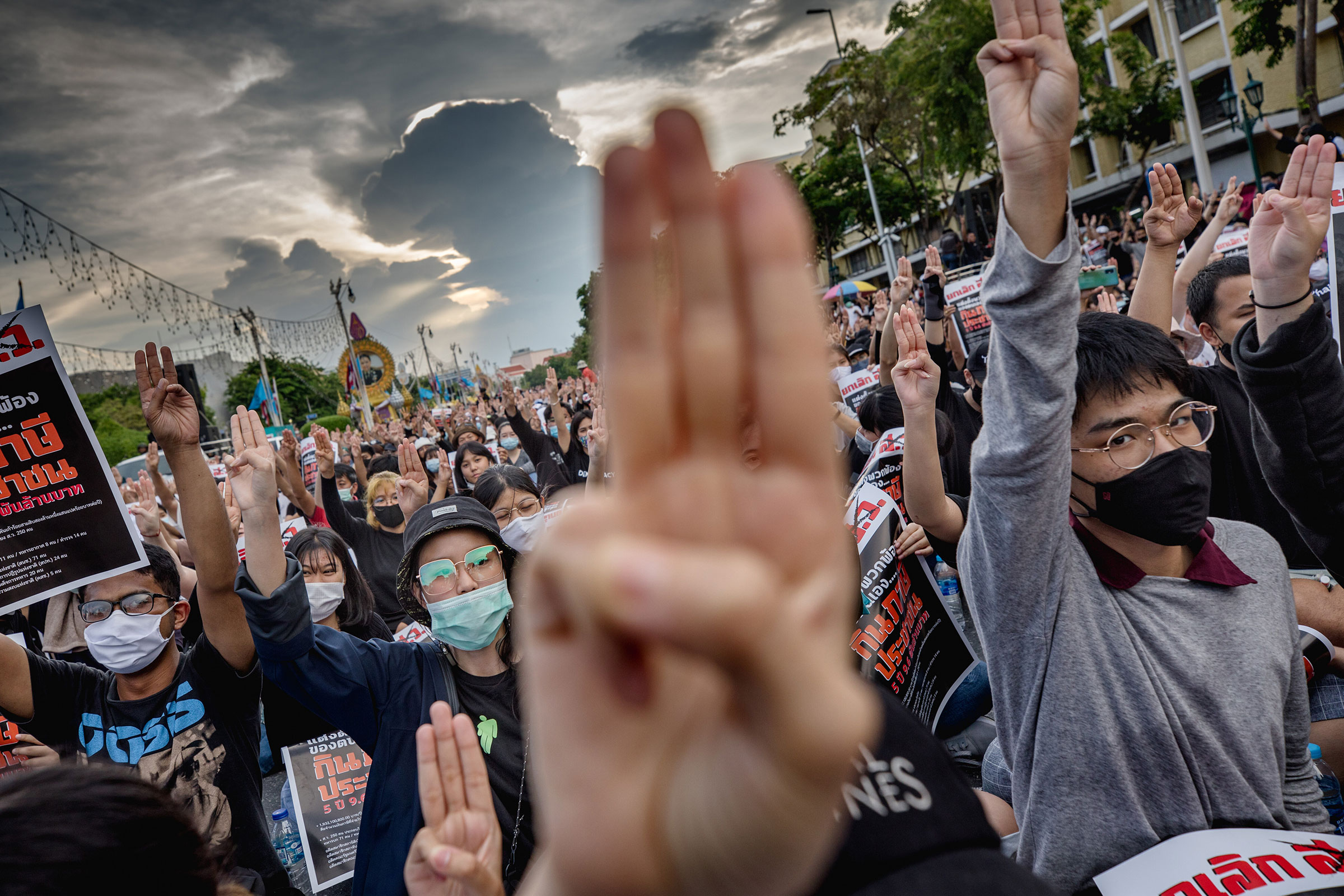
Rising 34 stories above Bangkok’s Phetchaburi Road, the Thai Summit Tower is the headquarters of Thailand’s largest car parts manufacturer. Until recently, it was also home to an upstart political party headed by the company’s 41-year-old heir, Thanathorn Juangroongruangkit. On the fifth floor, he and the fresh-faced activists of the Future Forward Party (FFP) would hold boisterous press conferences and hushed policy meetings. They gained 17% of the vote in last year’s general election despite being barely a year old.
That remarkable showing should have thrust 81 FFP lawmakers into Thailand’s 750-seat National Assembly. But the political establishment struck back. First, Thanathorn was banned from politics over shares he allegedly held in a media company. (Thai law says electoral candidates cannot hold such shares; Thanathorn insists they had been transferred to his mother.) Then, on Feb. 21, the party was dissolved over alleged funding irregularities. The legal action was described as “politically motivated” by Human Rights Watch. With it, the political will of 6.3 million voters was snuffed out.
Sitting down with TIME in the week before that decision, Thanathorn was sanguine. Over the past two decades, populist governments in Thailand have been removed from power twice by the military and three times by the courts. The FFP may have been a long way from Government House but the power nexus centered around the palace, the courts and the military was evidently spooked.
“The Future Forward Party is a vehicle, but even if they dissolve us, we will continue the journey,” shrugged Thanathorn at the time. “This year, I’m sure, with me leading, or otherwise, we’ll return to public demonstrations.”
That’s to be expected. In the parlance of travel marketing, Thailand has long been sold as the Land of Smiles, but it could just as fairly be called the Land of Protests or Country of Coups. The Southeast Asian nation of 70 million has gone through seven attempted and 12 successful coups over the past century, while recent years have been punctuated by color-coded street protests aimed at paralyzing the sprawling capital. (Urban and southern royalists typically don yellow; rural voters from populous, rice-growing northern provinces wear red.)
Today, people are taking to the street once again. Clad in face masks, and flashing the three-fingered Hunger Games salute to the sound of Thai rap, thousands of protesters have thronged the capital over recent months, demanding political reform of a military-backed government seen as bungling and corrupt. While political grievances have festered for decades, “the FFP dissolution was the last straw,” says Thitinan Pongsudhirak, associate professor of political science at Bangkok’s Chulalongkorn University.
In terms of numbers, these are the biggest demonstrations since those preceding the 2014 coup d’état. In their ambition, however, they are unprecedented. Protesters have drawn up a 10-point manifesto that includes reform of the sacrosanct royal family and an overhaul of political institutions including a new constitution and elections. Coup leader General Prayuth Chan-ocha—now serving as prime minister, largely owing to a new constitution dictated by the military—warned last month that the protesters “really went too far.”
University and high school students are in the vanguard. Thitinan hasn’t seen anything like it in 27 years of academia. “The students feel empowered, they are wide awake, pay more attention, nobody’s falling asleep in class,” he says. “It’s astonishing for me, personally, as a teacher.”
Young Thais are also being galvanized by the pandemic, given the damage to Thailand’s tourism-reliant economy, which is forecast to shrink by 8-10% this year—the sharpest contraction in Southeast Asia. Coronavirus’ role in stoking the protests has “been huge, as people don’t see a future,” Thanathorn says. “The anger is there. It’s waiting to burst.”

‘It’s divide and conquer’
Instability in Thailand matters. It is America’s oldest ally in Asia and has served as a bulwark to more authoritarian, left-leaning neighbors ever since the Thai establishment, backed by Washington, constructed a national identity and cult of personality around Massachusetts-born King Bhumibol Adulyadej. During the 60s and 70s, huge posters of Bhumibol, paid for by American taxpayers, were distributed across the country to help win over hearts and minds in the face of a communist insurgency. But as the Cold War thawed, Bhumibol’s influence faded along with his health. By the time of his death in 2016, he remained an object of veneration for ordinary Thais but his role had morphed from a guarantor of political stability to underwriter of enormous wealth for courtiers and brass hats.
The latter still grip the levers of power. In the diplomatic vacuum left by the isolationist America First policy of President Trump, the junta has pushed Thailand towards China. Bangkok and Beijing have inked joint development projects and arms purchases, and the Thais have repatriated Chinese dissidents with scant regard to due process.
“As Washington condemned the [2014] coup and the junta cracked down on dissent, Beijing sidled up with infrastructure funding deals and promises of no-strings support,” says Sebastian Strangio, author of In the Dragon’s Shadow: Southeast Asia in the Chinese Century.
Meanwhile the relationship between palace and army continues to be extremely close (Thai historian Thak Chaloemtiarana calls it “despotic paternalism”) and the stock justification for every military intervention remains “protection of the monarchy.” Thanathorn is not alone when he says the generals are responsible for Thailand’s cycle of protests and coups.
“We have enough evidence to show that a military-sponsored information operation installs hatred into society,” he says. “It’s divide and conquer.”
The military is getting richer in the process, controlling golf courses, horse-racing tracks and muay Thai stadiums. It owns hotel chains, conference centers, free trade zones and even TV and radio stations. In parliament, the 81 senators who are also generals have an average wealth of 78 million baht ($2.5 million) each, but 40 years of a general’s official earnings amounts to 48 million baht ($1.5 million)—and that’s assuming not a satang (or penny) is spent. According to legislative documents obtained by the FFP, Thailand’s military had off-budget spending of 18 billion baht ($580,000,000) last year.
“It’s a state within a state,” says Thanathorn. “Even MPs cannot see through their budgets, cannot audit income [and] expenses. Imagine if we used this money for schools and hospitals.”
On Feb. 8 and 9, the venality turned deadly. In Korat, a city 180 miles northeast of Bangkok, a soldier went on a killing spree that claimed 29 lives and wounded 58 others. The deadliest mass shooting in Thailand’s history began with the 31-year-old perpetrator slaying a superior officer, as well as the officer’s mother-in-law, whom he accused of cheating him in a lucrative land deal. He was eventually cornered in a shopping mall and killed. “Rich from cheating and taking advantage of people” he posted online during the rampage. “Do they think they can take money to spend in hell?”
In the wake of national mourning, reforms were promised. Still, in a tearful address, Thailand’s top general, Apirat Kongsompong, referred to the military as a “sacred” institution.
“What the hell? It’s a freaking army,” says Tony Davis, a Bangkok-based security analyst for IHS-Janes. “Every country needs one but do your job properly instead of floundering around in business activities.”
For Thanathorn, Korat offered “the best opportunity in 100 years” to push for reform. “We should not let those families suffer for nothing.”

‘He’s pressing all the buttons’
Despite his considerable wealth, Thanathorn has long been an iconoclast. His uncle served as minister of transport between 2002 and 2005 and is now a senior figure in Thailand’s biggest pro-military party, but Thanathorn insists his family were always outsiders. His grandfather emigrated to Thailand from southern China’s Fujian province in the early 20th century. In 1977, Thanathorn’s father started Thai Summit, and he says he grew up in a middle-class household, walking or taking the bus to class like his peers. It wasn’t until high school that the family firm started booming on the strength of lucrative contracts with Japanese auto firms, beginning its transformation into an empire with $2.5 billion in annual revenue.
“That’s when I could see the gap between me and my friends,” Thanathorn says.
It’s also when Thailand’s glass ceiling became apparent. “When we began having wealth, my parents wanted to be recognized, to be one of the elite,” he says. “They tried to donate, to mingle with politicians and people in power. But we learned no matter how much we tried, we cannot be one of them, because we are new rich. So my parents stopped trying.”
But they refused to spoil the princeling. From the age of ten, Thanathorn was sent during school holidays to toil in restaurants, washing dishes and scrubbing floors. At a hotel, he lugged bags and cleaned rooms. He loaded pallets of goods onto sooty trucks at a warehouse.
“I wasn’t very happy about it at the time,” he laughs, “but I learned the gap between rich and poor. But back then, I didn’t think that it was structural. I didn’t know whether this gap was about opportunities or individual performance.”
It was while studying mechanical engineering at Bangkok’s Thammasat University that he had an awakening. “In my second year, I went to a slum in Bangkok for the first time,” he says, “My thinking changed drastically because I saw the social struggle.”
Thanathorn became a student activist for progressive causes, campaigning for issues like compensation for those evicted to make way for state development projects. Then he studied at Nottingham University in the U.K., where he became involved with the student branch of the far-left Socialist Workers Party. “I learned the way they mobilize, the way they organize,” he says. Afterward, a joint masters in global finance between Hong Kong University and NYU beckoned.
For Thanathorn, those studies laid bare the realities of Thailand’s kleptocratic economy. Minimal property taxes mean the rich can sit on huge assets, while many sectors are sealed off from competition. For example, craft breweries have sprung up across the world to cater for a new generation of beer fans. In Thailand, however, selling small-batch brew is banned under a decades-old law that shields two huge family-run corporations, which monopolize 90% of a $5.7-billion market. And while in most countries, several duty-free concessions are assigned for commercial airports—Seoul’s Incheon International Airport has a dozen—in Thailand, one firm with close government ties has been awarded the sole concession to Bangkok’s main airports for over two decades without formal bids, creating a multi-billion-dollar family empire from scratch. In Thailand, “you create billionaires within one generation without innovation or anything,” says Thanathorn.
After completing his studies, Thanathorn had plans to pursue a career in international development with the U.N. But following his father’s death from cancer in 2002, he returned to Thailand to assume leadership of Thai Summit at just 23, helming it for 17 years until he founded the FFP.
His political style wasn’t without detractors. Many disagreed with Thanathorn’s abrasive tactics, such as his public shaming of senior establishment figures—not done under Thailand’s strict social codes.
“He’s pressing all the buttons that are guaranteed to rile [the elite] instead of framing the problem in a manner which they cannot dispute,” says Davis.
Even those who have built a career out of needling the establishment harbor doubts. The political artist Headache Stencil—dubbed “Thailand’s Banksy,” says “Thanathorn is more like a revolutionary than a political leader … But he can shepherd the transition to someone else who is calmer and more suited to lead.”
But large numbers of voters were won over by the self-styled “billionaire commoner” with the sharp, handsome features and boy-band spiky hair. According to a late 2019 poll by the National Institute of Development Administration, 31% of respondents tabbed Thanathorn as best qualified to be prime minister, with Prayut named by just 23%.

‘Thailand’s inconvenient truth’
Father to four young children, Thanathorn professes a love of reading everything from Khaled Hosseini to Game of Thrones. “I preferred the books to the TV series,” he says.
There is certainly no end of palace intrigue in Thailand. After a string of scandals—and with his lavish, eccentric lifestyle—King Maha Vajiralongkorn, Bhumibol’s son, has failed to command the same respect as his father. The four-times married, former Air Force pilot once promoted his pet poodle, Fu-Fu, to the rank of Air Chief Marshall. Since ascending the throne, he’s consolidated power while spending much of his time overseas. In 2017, the King introduced a new salute and haircut for the armed forces to match those of his own bodyguards. That same year, a 1936 law was amended to give him full control of the Crown Property Bureau, which manages the palace’s estimated $30 billion fortune. Last October, he ordered the transfer of two prestigious army units to his direct command, making them an effective “praetorian guard,” says Davis.
On Sept. 2, reports emerged that the King’s former consort, Sineenat Wongvajirapakdi—who last year was arrested, stripped of all royal titles and had her family home demolished for disloyalty—was suddenly deemed “untainted” and had her privileges restored. The hashtags #FreeOfBlemish and #ReformTheMonarchy were top trends on Twitter in Thailand after the news broke.
“The King’s treatment of Sineenat as a possession, put away and taken out at his will, is one of many reasons why protesters in Thailand have broached the taboo topic of the monarchy,” says Tamara Loos, professor of history and Thai studies at Cornell University.
That such lurid plots play out against the backdrop of Thailand’s worst economic crisis since 1997 incenses young Thais. Unbound by the same existential fear of creeping communism as their parents and grandparents, today’s youth demand a more equitable society. But the Thai monarch is protected by what are considered the world’s harshest royal defamation laws—known as lèse majesté or Section 112—that carry a penalty of 15 years in prison, and which have increasingly been used to quash dissent.
On June 4, a Thai democracy activist, Wanchalearm Satsaksit, was kidnapped in Cambodia and is believed murdered. He was on a government list of 29 exiled activists accused of violating Section 112, of whom at least eight have disappeared or been discovered dead. The situation inside Thailand is also deteriorating. On 9 July, a man from Thailand’s northeast was thrown into a psychiatric hospital for wearing a shirt emblazoned with, “I’ve lost faith in the institution of the monarchy.” One protest leader, human rights lawyer Anon Nampa, who has been outspoken in calling for royal reform, has been arrested three times in recent weeks and charged with sedition. “Thailand’s inconvenient truth” is how Thanathorn describes co-option of the royal institution.
“Let me be clear about this: reforming the monarchy does not equal abolishing the monarchy,’ he says. “It’s the powers and goals of the monarchy that don’t suit the principle of democracy that have to be changed.”
Thanathorn says he and the current protesters “share the same ideas about the future of the country” but have chosen different paths—within the system and outside it. His ban from politics means he cannot stand for election, though a loophole has seen him appointed by sympathetic lawmakers to a budget scrutiny committee, which has already trimmed $1 billion from the books, including the cancellation of two Chinese-built submarines for the military. Thanathorn has also broken a taboo by openly questioning the royal budget.
It’s a risky strategy. The government still holds all the cards, including the backing of the parliament, military, palace and judiciary. Thanathorn has already been charged with seeking to abolish the monarchy and sedition, though was acquitted on both counts. Other than disappeared and caged activists, in recent years two anti-establishment Thai prime ministers have been forced into exile and convicted in absentia on charges they claim were politically motivated. Thanathorn insists he won’t flee his homeland even if it means jail—or worse.
“So be it, I’m not afraid,” he says. “If I don’t do this, I don’t see anyone else doing it.”
More Must-Reads from TIME
- Cybersecurity Experts Are Sounding the Alarm on DOGE
- Meet the 2025 Women of the Year
- The Harsh Truth About Disability Inclusion
- Why Do More Young Adults Have Cancer?
- Colman Domingo Leads With Radical Love
- How to Get Better at Doing Things Alone
- Michelle Zauner Stares Down the Darkness
Write to Charlie Campbell / Bangkok at charlie.campbell@time.com